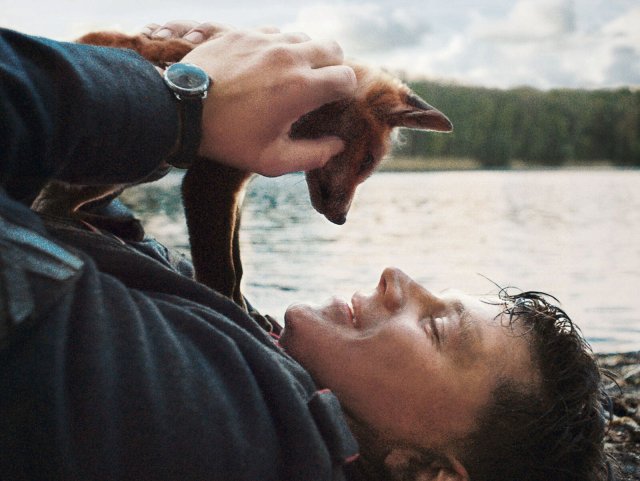The fox orphan no longer leaves Franz’s (Simon Morzé) side.
Photo: © Alamode Film
It is a remote mountain idyll in Pinzgau in Austria in 1927. But here a family with eleven children lives in absolute poverty. People work hard and hardly talk to each other. The highest feeling is when the father (memorably: Karl Markovics), who is visibly overwhelmed by the daily backbreaking work, sings a few songs in the evening – a particularly outstanding scene photographed by the cameramen Yoshi Heimrath and Paul Sprinz, which remains in the memory, especially since the actors* Inside everyone sings and talks in the old Pinzgau dialect.
When his youngest son Franz was lying in bed with a fever, his father even told him a story. It’s about the Krausenbauer who tricked the Grim Reaper – a story that was only ever passed down orally in this area. Ultimately, however, the father has to sell the weak child to a large farmer because he can no longer feed him.
The eight-year-old, whose parents have not let him in on their plans, tries with his hands and feet to defend himself against his buyer. But his spoiled mother slams the door in his face and his beloved father also turns away from him in quiet desperation. The sensitive boy never recovers from this psychological injury.
Released from bondage as an adult, the extremely emotionally withdrawn Franz, who is touchingly portrayed by Simon Morzé (“The Tobacconist”), joined the Federal Army in 1937 and, after the annexation of Austria, went to the Western Front as a soldier in the Second World War. He only gets along fairly well with his comrades, most of whom are played by amateurs; He never learned to talk to others or have fun, let alone make friends.
In the forest, the strange outsider finds an injured fox pup who is running excitedly back and forth next to his mother, who died in an animal trap. The fox is just as disturbed as he was when the farmer took him away from his parents.
From then on, Franz takes care of the delicate creature like a loving father would his child – not an easy task, as he is otherwise surrounded by death and destruction. He also has to hide the fox from the others. Soon the fox orphan no longer leaves his side.
Franz, who is employed as a motorcycle courier, hides his fellow sufferer in his sidecar and, pumped up with drugs, drives with him past piles of corpses and explosions for days and nights.
But just like Franz, the audience only experiences the war peripherally. The main focus of the anti-war film, shot in a narrow 4:3 format – and with its rounded corners looking like photos from that time in motion – rests on how the young man gradually recovers a little from his deep-seated childhood trauma by cares for the animal as devotedly as he would have liked his parents to treat him.
By the way, the fox in the film is not animated, but rather a trained wild animal. The adult fox, which can be seen in most scenes, was raised by the main actor with a bottle, which makes the character drama seem particularly authentic.
When the soldiers occupied France in 1940 and spent almost a year there, Franz met the French farmer Marie (Adriana Gradziel) in Normandy, who was touched by how lovingly the reserved soldier cared for his fox. Franz also gains a little trust in a person for the first time and protects Marie from having her house invaded.
Soon Franz, like his father, has to make a similarly difficult decision for the well-being of his fox, which casts his parents’ cruel act of giving him away in a different light.
Adrian Goiginger made the impressive, award-winning debut film “The Best of All Worlds” when he was just 26 years old, in which he tells the heartbreaking story of growing up with a mother who was addicted to heroin but loved him with all her remaining strength. In his third feature film, the young director, producer and screenwriter, who is worth keeping an eye on, once again draws on a true family story, this time that of his great-grandfather Franz Streitberger, who experienced a similar experience as a motorcycle courier for the Austrian army.
After the deeply moving end of the film, a photograph of the real Franz is shown, and you can hear a voice-over excerpt from the many conversations that Goiginger began with his now deceased great-grandfather as a 14-year-old – and through which he also learned about the experienced an unusual friendship with the fox. The bond with the animal helped Franz survive the cruel war and regain his faith in love. Protecting lives instead of destroying them, what an important cinematic parable in these times.
“The Fox”: Germany, Austria 2022. Director and book: Adrian Goiginger. With: Simon Morzé, Karl Markovics, Verena Altenberger. 117 minutes, start: April 13, 2023.
Subscribe to the “nd”
Being left is complicated.
We keep track!
With our digital promotional subscription you can read all issues of »nd« digitally (nd.App or nd.Epaper) for little money at home or on the go.
Subscribe now!
